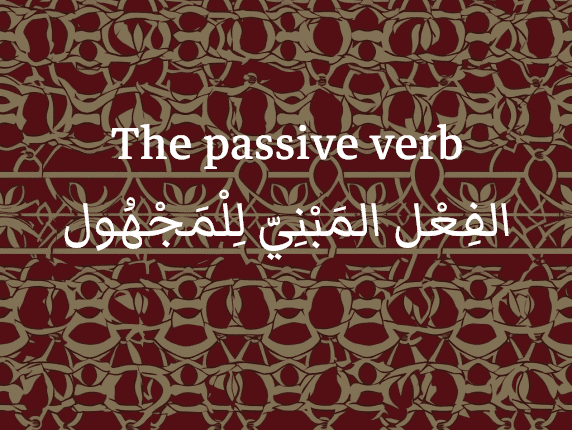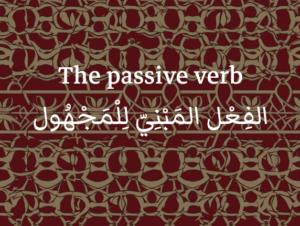The passive verb / الفِعْل المَبْنِيّ لِلْمَجْهُول

To talk about the passive voice in Arabic, we use the word مَجْهول (unknown).
The passive form is used when the performer of the action is unknown, ignored, or unimportant. Two components are inherent to a passive tense in Arabic:
- The subject-like / نائِب الفاعِل
- The passive verb / الفِعْل المَجْهُول
The subject-like and the passive verb / نائب الفاعل والفِعْل المَجْهول
We know that the active form is used in Arabic when the performer of the action is the subject. In the passive form, because the subject isn’t mentioned, then the direct object takes the place of the subject and goes to the nominative case (مَرْفُوع). This is called the subject-like or نائب الفاعل (which literally means ‘the deputy of the doer’). It may be an explicit noun or a pronoun. We will then use a passive verb that agrees with it in person, gender, and number (same as the active verb with the subject).
Only internal vocalization differentiates a passive verb (فِعْل مَجْهُول) from an active verb (فِعْل مَعْلوم): the context generally makes it possible to make the difference, otherwise, one notes a distinctive vowel. Passive form verbs generally have the ḍamma on the first radical and the kasra on the second for all forms. They are generally built on pattern فُعِلَ in the perfect tense (الماضي) and يُفْعَلُ in the imperfect tense (المُضارِِع المَرْفوع):
| Active (مَعْلُوم) | Passive (مَجْهُول) |
|---|---|
| يَقْرَأُ الطالِبُ الكِتَابَ The student reads the book | يُقْرَأُ الكِتَابُ The book is read |
| أَصْلَحَ السَبّاكُ آلةَ الغَسْلِ The plumber fixed the washing machine | أُصْلِحَ آلةُ الغَسْلِ The washing machine has been fixed |
| أَكَلَتْ الفَتاةُ التُفاحَ The girl ate the apples | أُكِلَ التُفاحُ The apples were eaten |
Note: When a verb is constructed in the active form with two direct object complements, it can be converted to passive in two ways:
- The recipient of the action can become subject-like while the given object remains in the accusative case (مَنْصُوب).
- Alternatively if desired, the given object can take on more of a subject role while the addressee will be preceded by the preposition لِ (but this is more a dialectal influence).
The woman was granted a son وُهِبَتْ المَرْأَةُ وَلَدًا A son was granted to the woman وُهِبَ وَلَدٌ للمَرْأَةِ
The complement of agent
There is no complement of agent expressed in traditional Arabic, so if the performer of the action is mentioned, an active verb should be used instead. However, Modern Arabic is increasingly using compound prepositions to express the semantic agent in passive sentences, often due to European language influence, even though these are considered erroneous by purists. The most common compound prepositions used to express the passive agent are; مِن طَرَف / مِن قِبَلِ / مِن جانِبِ all meaning ‘by’.
| مِن جانِبِ | مِن قِبَلِ | مِن طَرَف | |
| from the side of, on behalf of = by | |||
Examples:
| The changes were made by the researchers | أُجْرِيَتْ التَغْيِيراتُ مِن جانِبِ الباحِثِينَ. |
| The request is taken by the staff | يُؤْخَذُ الطَلَبُ مِن قِبَلِ المُوَظَّفِينَ |
| The task has been requested by the director | طُلِبَتْ المُهِمّةُ مِن طَرَف المُدِيرِ |
Passive verb conjugation
All verbs and forms I to X follow one vocal pattern when using the passive perfect tense. The first root vowel is ḍamma /u/ and the second root vowel is kasra /i/. This creates the masculine singular third-person form فُعِلَ.
Similarly, the imperfect verb has a single pattern of vowelling for all verbs with the first radical being ḍamma and the middle radical holding the fatḥa /a/, resulting in the basic structure يُفْعَلُ.
Forms I to X
| المَجْهُول Passive | المَعْلوم Active | الأَوْزان Forms | |||
|---|---|---|---|---|---|
| المُضارِع Imperfect (present) | الماضي Perfect (past) | المُضارِع Imperfect (present) | الماضي Perfect (past) | ||
| يُفْعَلُ | فُعِلَ | يَفْعَلُ | فَعَلَ | I | |
| يُفَعَّلُ | فُعِّلَ | يُفَعِّلُ | فَعَّلَ | II | |
| يُفاعَلُ | فُوعِلَ | يُفاعِلُ | فاعَلَ | III | |
| يُفْعَلُ | أُفْعِلَ | يُفْعِلُ | أَفْعَلَ | IV | |
| يُتَفَعَّلُ | تُفُعِّلَ | يَتَفَعَّلُ | تَفَعَّلّ | V | |
| يُتَفَاعَلُ | تُفُوعِلَ | يَتَفاعَلُ | تَفاعَلَ | VI | |
| N/A | N/A | يَنْفَعِلُ | اِنْفَعَلَ | VII | |
| يُفْتَعَلُ | اُفْتُعِلَ | يَفْتَعِلُ | اِفْتَعَلَ | VIII | |
| N/A | N/A | يَفْعَلُّ | اِفْعَلَّ | IX | |
| يُسْتَفْعَلُ | اُسْتُفْعِلَ | يَسْتَفْعِلُ | اِسْتَفْعَلَ | X | |
✨ Try out the automatic verb conjugator here
Note: The derived verb forms VII and IX have no passive because they have an intransitive meaning or already express the passive (or at least the reflexive-passive), even if they are formally conjugated in the active form. This is also the case for some verbs in form V.
To break oneself اِنْكَسَرَ Form VII To turn yellow اِصْفَرَّ Form IX to be held/suspended تَعَلَّقَ Form V
Irregular verbs
| المَجْهُول Passive | المَعْلوم Active | الأَفْعال غَيْر السالِمة Irregular verbs | |||
|---|---|---|---|---|---|
| المُضارِع Imperfect (present) | الماضي Perfect (past) | المُضارِع Imperfect (present) | الماضي Perfect (past) | ||
| يُسَدُّ | سُدَّ | يَسُدُّ | سَدَّ | المُضاعَف Doubled roots | |
| يُوصَلُ | وُصِلَ | يَصِلُ | وَصَلَ | المِثال Assimilated roots | |
| يُقالُ | قِيلَ | يَقُولُ | قالَ | الأَجْوَف Hollow roots | |
| يُعاشُ | عِيشَ | يَعِيشُ | عاشَ | ||
| يُنالُ | نِيلَ | يَنالُ | نالَ | ||
| يُدْعى | دُعِيَ | يَدْعو | دعا | الناقِص Defective roots | |
| يُجْرى | جُرِيَ | يَجْرِي | جَرى | ||
✨ Try out the automatic verb conjugator here
Expression of passive with تَمّ
In addition to the passive form for verbs, another alternative way to convey a passive tense meaning which had become now predominant in Modern Standard Arabic is the use of verb تَمَّ in the perfect tense (الماضي) followed immediately by a verbal noun/maṣdar (مَصْدَر) in the nominal case (مَرْفُوع). The verb agrees in gender with the maṣdar.
تَمَّ + مَصْدر = المَجْهُول
| The car has been repaired | تَمَّ إِصْلاحُ السَيّارةِ |
| The report has been written | تَمَّتْ كِتابةُ التَقْرِيرِ |
The passive verb

The Passive Verb" could be: Learn how to form and use the passive voice in Arabic with our comprehensive guide. Master the different verb forms and sentence structures to express actions done to the subject, and improve your Arabic writing and communication skills.
Course Provider: Organization
Course Provider Name: ArabiKey
Course Provider URL: https://arabikey.com
5

Responses